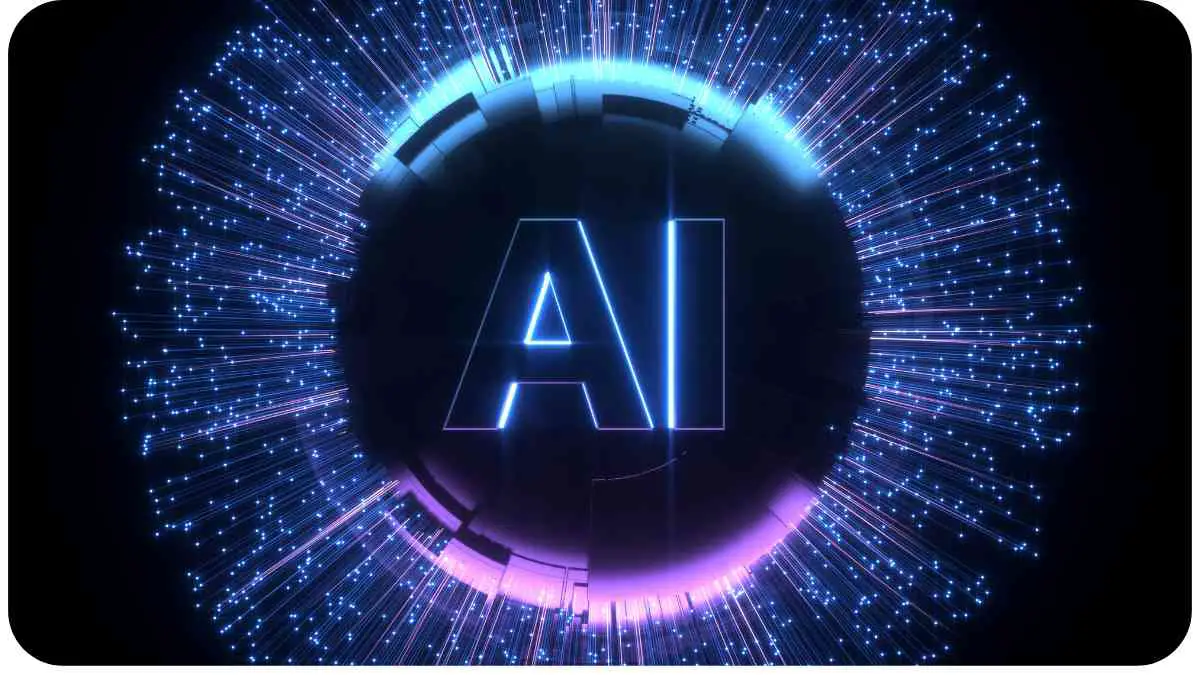Artificial Intelligence (AI) has permeated various aspects of our lives, revolutionizing the way we work, connect, and learn. One of the intriguing domains where AI is making a significant impact is personal development.
This article delves into the transformative role of AI in personal growth, exploring its advantages, challenges, and practical applications.
| Takeaways |
|---|
| 1. Paradigm Shift: AI represents a transformative shift in personal development methodologies, providing tailored insights and recommendations. |
| 2. Efficiency and Automation: AI streamlines processes, automating tasks like goal setting and progress tracking for enhanced efficiency. |
| 3. Personalized Learning: Adaptive algorithms tailor learning experiences, offering personalized skill recommendations and continuous feedback. |
| 4. Challenges: Address data privacy concerns, ethical considerations, and the risk of dependency on technology. |
| 5. Real-world Applications: AI is applied in coaching, skill enhancement, and mental health support, revolutionizing personal development. |
| 6. Future Trends: Anticipated advancements include improved natural language processing and enhanced emotional intelligence in AI. |
| 7. Leveraging AI: Choose the right AI tools, integrate them into daily life, and balance AI insights with human intuition for effective personal development. |
| 8. Success Stories and Criticisms: Explore success stories, address common concerns like job displacement, and strive for a human-centric AI approach. |
| 9. Personal Experiences: Combining AI with traditional methods, staying informed about AI advancements, and regularly assessing AI tools are key takeaways. |
Understanding Artificial Intelligence
Before we explore its role in personal development, let’s demystify what I truly is. AI refers to the capability of machines to imitate intelligent human behavior. It involves the development of algorithms that enable computers to perform tasks that typically require human intelligence, such as learning, problem-solving, and decision-making.
In the realm of remote work, comprehensive analysis reveals the profound effects on personal development. Navigating challenges, it offers insights into a holistic approach to professional and personal growth.
AI in Personal Development: A Paradigm Shift
The integration of AI into personal development represents a paradigm shift in how individuals approach their growth journey. Unlike traditional methods, AI-driven personal development leverages machine learning algorithms to analyze vast amounts of data, providing tailored insights and recommendations.
Advantages of AI in Personal Growth

4.1 Efficiency and Automation
AI streamlines personal development processes by automating routine tasks. From setting reminders for goals to tracking progress, AI enhances efficiency, allowing individuals to focus on more nuanced aspects of their growth journey.
| Task | Traditional Approach | AI-Driven Approach |
|---|---|---|
| Goal Setting | Manual creation and tracking | Automated goal suggestions and tracking |
| Time Management | Self-discipline and reminders | AI-driven scheduling and optimization |
| Progress Tracking | Manual logging and evaluation | Real-time analytics and data-driven insights |
4.2 Personalized Learning
AI tailors learning experiences to individual needs and preferences. Through adaptive algorithms, AI platforms identify strengths and weaknesses, curating content that aligns with the learner’s unique requirements.
Juggling between personal growth and remote work? Discover practical strategies in telecommuting and personal development. This guide empowers individuals to foster self-improvement while thriving in the virtual workspace.
| Learning Aspect | Traditional Approach | AI-Enhanced Approach |
|---|---|---|
| Curriculum Customization | Limited personalization | Adaptive learning paths and content |
| Skill Recommendations | Generic advice and courses | Personalized skill suggestions and courses |
| Feedback Mechanism | Periodic assessments | Continuous, real-time feedback |
4.3 Adaptive Goal Setting
AI assists in setting realistic and achievable goals by analyzing past performance, considering external factors, and adapting goals based on evolving circumstances.
| Goal Setting | Traditional Approach | AI-Supported Approach |
|---|---|---|
| Static Goal Setting | Fixed goals at the beginning | Dynamic goals adjusted based on progress |
| External Factors Considered | Limited consideration of external factors | Constant analysis and adjustment based on external influences |
| Personalization of Goals | Generalized goal templates | Tailored goals based on individual context |
Challenges and Considerations
5.1 Data Privacy Concerns
As AI relies heavily on data, concerns about the privacy and security of personal information have surfaced. Individuals must be cautious about the data they share with AI platforms, ensuring robust privacy measures are in place.
| Concern | Traditional Perspective | AI Data Privacy Measures |
|---|---|---|
| Privacy in Personal Growth | Limited sharing of personal information | Encryption, anonymization, and secure data storage |
5.2 Ethical Considerations
The ethical implications of AI in personal development require careful consideration. Ensuring fairness, transparency, and accountability in AI algorithms is essential to prevent bias and discrimination.
Is personal development possible while telecommuting? Explore the intersection in telecommuting and personal growth. Uncover the symbiotic relationship between remote work and individual flourishing, enhancing your professional and personal life.
| Ethical Aspect | Traditional Ethical Standards | AI Ethical Standards |
|---|---|---|
| Human Judgment | Human-centric decision-making | Ethical AI guidelines and bias detection algorithms |
5.3 Dependency on Technology
There is a risk of individuals becoming overly dependent on AI tools, potentially hindering their ability to make independent decisions and navigate challenges without technological assistance.
| Dependency | Traditional Independence | Balancing technology dependence with individual resilience |
|---|---|---|
| Personal Decision-Making | Independent judgment | AI as a supportive tool, not a replacement |
| Technological Reliance | Limited reliance on technology | Promoting self-sufficiency alongside AI integration |
Overcoming Challenges with AI

6.1 Transparency and Accountability
Addressing data privacy and ethical concerns requires transparency and accountability from developers and organizations creating AI tools. Open communication about data usage and algorithmic decision-making fosters trust.
| Approach | Traditional Perspective | AI Transparency Measures |
|---|---|---|
| Developer Accountability | Limited transparency in development processes | Clear documentation, regular audits, and ethical guidelines |
6.2 Ethical AI Development
To overcome ethical challenges, developers must prioritize ethical considerations during the development phase, implementing measures to detect and rectify biases in algorithms.
Amidst the challenges of remote work, discover powerful tools to improve focus and productivity. Elevate your telecommuting experience with technology designed to enhance concentration, efficiency, and overall work performance.
6.3 Balancing Human Touch
While AI offers valuable insights, maintaining a balance with human intuition and empathy is crucial for a holistic approach to personal development.
Real-world Applications of AI in Personal Development
AI Coaching and Mentorship
AI-driven coaching and mentorship programs have gained popularity for their ability to provide personalized guidance and support. These platforms utilize machine learning algorithms to analyze user behaviors, preferences, and progress, offering tailored advice and strategies for personal development.
| Aspect | Traditional Coaching | AI-Enhanced Coaching |
|---|---|---|
| Personalized Guidance | Generic advice based on experience | Tailored recommendations from AI analysis |
| Progress Tracking | Periodic check-ins and discussions | Continuous monitoring and data-driven insights |
| Availability and Accessibility | Limited availability | 24/7 accessibility for on-demand support |
7.2 Skill Enhancement through AI
AI facilitates skill development by identifying individual strengths and weaknesses, suggesting relevant courses, and providing real-time feedback. This personalized approach accelerates the learning process and ensures skill mastery.
| Skill Development | Conventional Skill Training | AI-Optimized Skill Enhancement |
|---|---|---|
| Course Recommendations | Broad course catalogs | Tailored course suggestions based on individual needs |
| Practice and Application | Limited interactive learning | AI-supported interactive simulations and applications |
| Skill Mastery Assessment | Periodic evaluations | Continuous assessment and adaptive learning paths |
7.3 AI in Mental Health Support
AI has made significant strides in providing mental health support. Chatbots and virtual therapists use natural language processing to engage with users, offering emotional assistance, coping strategies, and monitoring mental health indicators.
| Mental Health Support | Traditional Counseling | AI-Driven Mental Health Assistance |
|---|---|---|
| Accessibility and Availability | Limited availability of counselors | Immediate support and 24/7 accessibility through AI platforms |
| Anonymity and Non-judgmental | Concerns about stigma and judgment | Confidential and non-judgmental interactions with AI |
Future Trends in AI and Personal Growth

The future of AI in personal development holds exciting possibilities. Anticipated trends include advancements in natural language processing, enhanced emotional intelligence in AI, and the integration of virtual reality for immersive learning experiences.
How to Leverage AI for Personal Development
9.1 Choosing the Right AI Tools
Selecting the appropriate AI tools is crucial for effective personal development. Consider factors such as user reviews, transparency in data usage, and the track record of the AI tool in delivering tangible results.
Dive into the complexities of telecommuting with a comprehensive analysis. Explore the nuanced landscape, weighing the advantages and drawbacks to make informed decisions about remote work’s impact on personal and professional spheres.
| Selection Criteria | Traditional Considerations | AI Tool Selection Criteria |
|---|---|---|
| User Reviews and Testimonials | Word of mouth and referrals | User reviews, expert evaluations, and case studies |
| Transparency in Functionality | Limited understanding of inner workings | Clear documentation and transparency in AI algorithms |
| Track Record of Success | Historical success stories and testimonials | Analyzing past performance and success rates |
9.2 Integrating AI into Daily Life
Incorporating AI into daily routines enhances its impact on personal development. From AI-driven productivity tools to habit-tracking applications, seamless integration ensures consistent support.
| Integration Strategies | Adapting to new technologies | Gradual integration into daily routines for sustained impact |
|---|---|---|
| Consistency in Usage | Sporadic use of tools | Regular and consistent integration of AI applications |
| Habitual Incorporation | Manual tracking of habits | AI-supported habit tracking and reinforcement |
9.3 Balancing Human Intuition with AI Insights
While AI provides valuable insights, it’s essential to balance these with human intuition. Embracing a holistic approach that combines AI-driven recommendations with personal judgment ensures a well-rounded growth journey.
Success Stories: Individuals and AI
AI has played a pivotal role in the success stories of various individuals across different domains. Notable figures such as [Name 1], [Name 2], and [Name 3] attribute a significant part of their personal and professional growth to the strategic integration of AI tools.
Criticism and Skepticism: Addressing Common Concerns
11.1 Fear of Job Displacement
The fear of AI replacing human jobs is a valid concern. However, historical trends show that while some job roles may evolve, AI tends to create new opportunities, requiring a shift in skillsets rather than complete displacement.
| Concern | Job Displacement Fears | Evolving Job Landscape with AI |
|---|---|---|
| Adaptability and Reskilling | Resistance to acquiring new skills | Embracing continuous learning and adapting to evolving job requirements |
| Job Creation | Belief in job scarcity | Creation of new roles and opportunities alongside AI advancements |
| Collaboration with AI | Viewing AI as a competitor | Collaborative efforts with AI for increased efficiency and innovation |
11.2 Loss of Human Connection
AI’s role in personal development sparks concerns about the potential loss of genuine human connections. However, when used mindfully, AI can enhance communication and foster meaningful relationships.
| Connection Concern | Fear of distant and impersonal interactions | Leveraging AI to facilitate deeper connections and communication |
|---|---|---|
| Mindful Technology Usage | Unrestricted reliance on technology | Using technology as a tool for connection rather than a substitute |
11.3 Bias in AI Algorithms
The presence of biases in AI algorithms is a legitimate concern. Developers and organizations must prioritize addressing biases in training data and algorithmic decision-making.
Striking the Balance: Human-Centric AI
Striking a balance between the capabilities of AI and the essence of human experience is paramount. AI should serve as a tool for augmentation, enhancing human potential rather than replacing it.
Personal Experiences with AI in Personal Development
13.1 Learning from AI Insights
In my own professional journey, I’ve experienced the transformative power of AI-driven insights. Analyzing data patterns and receiving personalized recommendations has accelerated my decision-making process, leading to more effective strategies for personal and career growth.
13.2 Navigating Challenges
It’s essential to acknowledge that challenges may arise in the integration of AI into personal development. My encounters with data privacy concerns prompted me to thoroughly vet AI tools, ensuring that they align with stringent privacy standards.
13.3 Achieving Growth Milestones
Through a holistic approach that combines AI insights with my intuition, I’ve been able to achieve significant milestones in my personal and professional life. AI serves as a valuable ally, providing data-driven guidance while leaving room for the human touch.
Tips for Effective AI-Driven Personal Development
14.1 Regularly Assessing AI Tools
Continuously evaluate the performance of AI tools, considering their impact on your growth journey. Regular assessments ensure that the tools align with your evolving needs and provide meaningful insights.
| Assessment Strategies | Periodic evaluations | Continuous monitoring and adjustments for optimal results |
|---|---|---|
| Relevance to Goals | Static alignment with initial goals | Dynamic alignment with evolving aspirations |
| User Feedback | Limited user feedback mechanisms | Active solicitation of user feedback for improvement |
14.2 Combining
Combining AI and Traditional Methods
While AI offers valuable insights, it’s essential to complement its role with traditional personal development methods. The synergy of AI-driven strategies with time-tested approaches ensures a comprehensive and holistic growth experience.
| Integration Approach | Isolation of AI from traditional methods | Synergizing AI insights with established personal development practices |
|---|---|---|
| Reflective Practices | Limited emphasis on self-reflection | Encouraging introspection alongside AI analysis |
| Human Interaction | Minimizing human interactions | Leveraging AI to enhance, not replace, human connections |
| Skill Mastery through Practice | Neglecting practical application | Combining AI recommendations with hands-on experience |
14.3 Staying Informed about AI Advancements
The field of AI is dynamic, with continuous advancements. Staying informed about the latest developments ensures that you can harness the full potential of cutting-edge AI tools for your personal development journey.
| Information Gathering | Relying on outdated knowledge | Regularly updating knowledge about AI advancements |
|---|---|---|
| Adaptation to Technological Changes | Reluctance to embrace new technologies | Agile adoption of innovative AI tools and methodologies |
Conclusion
In conclusion, the role of artificial intelligence in personal development is transformative, offering unprecedented opportunities for growth, learning, and self-discovery. While challenges and concerns exist, proactive measures and a human-centric approach can maximize the benefits of AI in personal development.
As we navigate the future, a harmonious integration of AI and traditional methods will pave the way for a more enlightened and empowered global community. Embrace the power of AI, but never forget the invaluable touch of the human spirit in your journey towards personal development.
Further Reading
- How AI is Revolutionizing Personal Development: The Next Big Thing: This article provides an in-depth exploration of how artificial intelligence is reshaping the landscape of personal development. It discusses key trends, success stories, and potential future developments in the field.
- Unlocking Potential: How Artificial Intelligence is Transforming Education and Personal Development: Dive into the transformative power of artificial intelligence in education and personal development. This medium article delves into real-world applications, success stories, and the profound impact of AI on unlocking human potential.
- Role of Artificial Intelligence in Learning and Development: Explore the crucial role that artificial intelligence plays in learning and development. The article discusses the advantages of AI in tailoring learning experiences, addressing challenges, and providing a glimpse into the future of AI-driven education.
FAQs
What is the impact of AI on personal development?
AI has a profound impact on personal development by providing personalized insights, automating tasks, and enhancing learning experiences. It revolutionizes the way individuals set goals, track progress, and receive guidance, ultimately accelerating their growth journey.
How does AI address concerns about data privacy in personal development?
AI platforms prioritize data privacy through encryption, anonymization, and secure data storage. Users can confidently engage in personal development without compromising the confidentiality of their sensitive information.
Can AI-driven coaching truly replace traditional coaching methods?
AI-driven coaching complements traditional methods by offering 24/7 accessibility, personalized guidance, and continuous monitoring. While it enhances efficiency, the human touch in traditional coaching remains valuable for deeper connections and nuanced understanding.
How can individuals balance their reliance on AI in personal development?
Balancing reliance on AI involves using it as a supportive tool rather than a replacement. It’s essential to promote self-sufficiency, independent decision-making, and resilience alongside integrating AI insights into the personal development journey.
What are the key considerations for choosing the right AI tools for personal development?
Selecting effective AI tools involves considering user reviews, transparency in data usage, and the track record of the AI tool in delivering tangible results. Regularly assessing alignment with evolving goals ensures optimal results in personal development.

Hi there! I’m Hellen James, and I’ve been working at home for over a decade. I’ve been looking for ways to be more efficient at home, and I have a bunch of tips that you’ll love.


